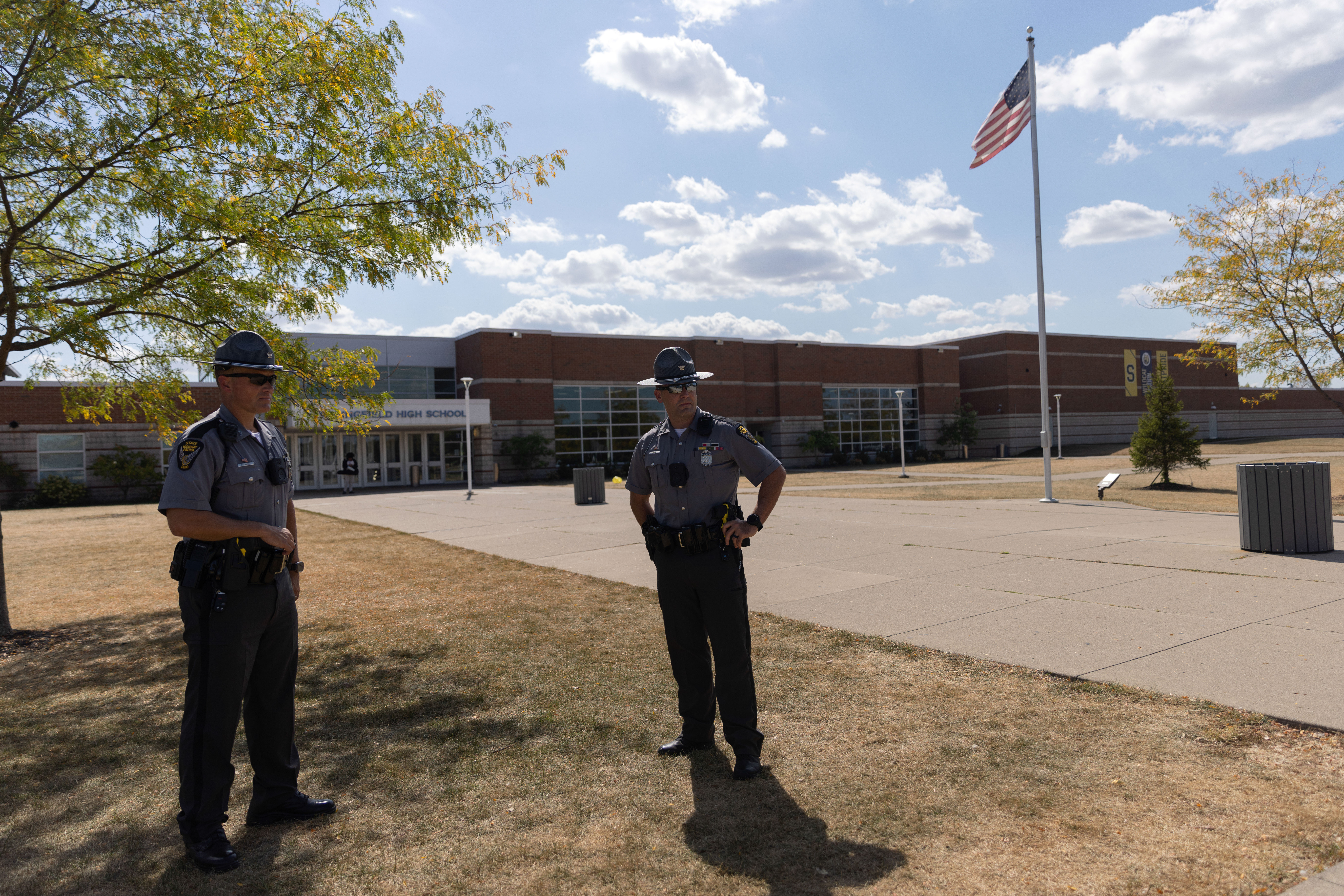‘Why they gotta threaten the kids?’: Springfield schools shrink under national scrutiny
Faced with constant threats, schools in Springfield, Ohio, took shelter as law enforcement brought in dogs, troopers, and watchtowers for protection.

Governor Mike DeWine of Ohio, a Republican, has responded by enhancing security measures around educational facilities and indicated that these threats predominantly originate from abroad. Meanwhile, Trump and his vice presidential candidate, JD Vance — a current Ohio Senator — persist in their contentious assertions about the situation.
“It doesn't make any sense, why they gotta threaten the kids? Kids ain't got nothing to do with the government and what's going on with politics, and it doesn't make any sense,” remarked Richard Butler, as he accompanied his young nieces home from school.
The frequency of threats has accelerated recently, targeting not only educational institutions but also other public spaces including hospitals and stores. Last week, some schools conducted evacuations, and after which, Governor DeWine arranged for state troopers to bolster security. Both local colleges transitioned to online classes this week due to ongoing safety concerns which even included a "suspicious package" scare at Clark State College.
Officials have implemented stringent security measures such as deploying mobile "SkyWatch" surveillance towers and stationing bomb-sniffing dogs as preventive steps. Despite these measures, Andy Wilson, Director of the Ohio Department of Public Safety, noted that the source of many threats had been found to be unsubstantial, including one instance where the suspected object turned out to be a discarded student project.
Wilson stated, “We've got a ton of resources on the ground.”
When asked about her sense of safety regarding her children's school environment, Amy Smith praised the community's diversity but expressed concern over extremist threats. Similarly, Cristino Aguilar, a decade-long resident originally from Mexico, shared his fears of random violence affecting his family.
Rob Baker, a Wittenberg University professor, reflected on the deserted campus atmosphere, disrupted by the ongoing threats which led the school to lock down facilities and move classes online temporarily. Wittenberg's financial struggles echo broader challenges faced by small liberal arts colleges nationwide, now exacerbated by the current security situation.
Jonathan Eilert, former chair of Wittenberg’s Board of Directors, lamented the timing of the disruptions, noting the impact on campus visits which are crucial for student recruitment during the picturesque autumn season.
In an official communication, Wittenberg's administration condemned nationally fueled xenophobic rhetoric and denounced any extremist actions in the community as severe threats to its members.
The persistent narrative by Trump and Vance concerning Haitian migrants, despite official denials and factual inaccuracies, continues to stoke tensions and fear in Springfield. The community and its leaders strive to counteract these disruptions and maintain peace and safety for all residents.As the situation unfolds, Springfield's residents are left grappling with the impact of the political climate on their daily lives. Many express a mixture of fear and frustration, noting that children and families should not be collateral damage in a heated political discourse. The emotional toll of living under a cloud of threats is evident, with parents like Amy Smith concerned for the well-being of their children amidst the chaos.
The local education system, already strained by the pandemic, now faces an additional layer of insecurity that disrupts teaching and learning. School officials are tasked with ensuring not just physical safety, but also the emotional well-being of students who might feel anxious or fearful as a result of the threats. Counselors are being deployed to address these concerns, but the pervasive atmosphere of fear makes it difficult to foster a stable educational environment.
Many in Springfield are rallying for solidarity and support, aiming to uphold the community's values of inclusivity and resilience. Local leaders and groups are organizing discussions to address the misinformation and promote understanding among residents. There is a recognition that the community must come together to counter the fear and division sowed by external narratives.
Amidst the turmoil, businesses in Springfield also feel the repercussions. Foot traffic is down as families choose to stay home rather than risk exposure to potential threats. Local shops and restaurants are reporting a decrease in customers, which could exacerbate economic challenges faced in the wake of recent disruptions.
Wittenberg University, eager to return to normalcy, is also under pressure. With critical events such as parents’ weekend and homecoming approaching, the administration is engaged in planning how to ensure these gatherings can proceed safely. Administrators are hopeful that with enhanced security measures and community support, they can restore a sense of normalcy on campus.
The broader implications of this situation extend beyond Springfield. As national political figures continue to fuel divisive rhetoric, communities across the country watch closely, concerned about how similar narratives may impact their own towns. Springfield serves as a testament to the ripple effects that politicized speech can have on local communities — altering social fabric, community relationships, and everyday life.
As Springfield residents continue to navigate this challenging landscape, there seems to be a collective determination to rise above the chaos. Despite the external pressures, many are committed to fostering a safe and welcoming environment, ensuring that Springfield remains a place of hope and unity, rather than fear and division. The resilience shown by families, educators, and local leaders may ultimately define the city’s response to these unprecedented challenges.
James del Carmen for TROIB News












